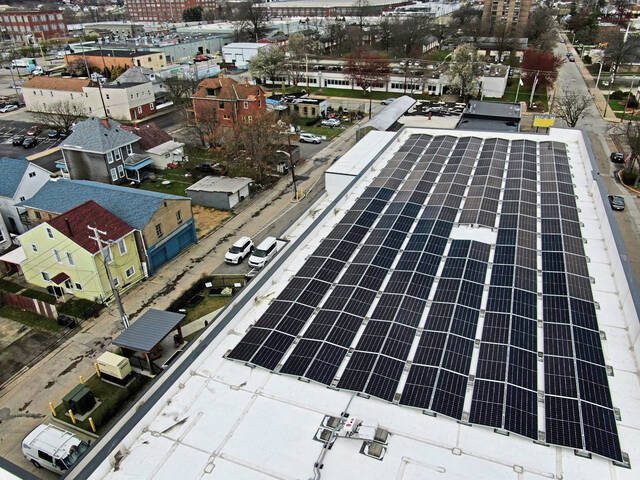A Pittsburgh nonprofit says that owners of 54 buildings in the New Kensington and Harrison areas could save almost $45 million on their electric bills over the next 25 years if they utilized the solar power potential of their properties.
Amelia Eggan, program manager of the nonprofit Pennsylvania Solar Center, pointed out that nonprofits could allocate more funds to their mission instead of operating expenses, schools could invest in staff and resources for students, and businesses could have more overhead to reinvest in materials and personnel.
The Solar Center estimated it would cost around $31,270 to install solar panels at New Kensington’s city hall and police department, after tax incentives. The panels would result in energy savings of $33,160 in the first year and $837,900 over 25 years.
The Solar Center plans to contact the owners of the properties involved in its solar mapping project in the next few months, Eggan said. The timing depends on the center’s hiring of more employees.
The nonprofit West Penn Power Sustainable Energy Fund provided Wesley Family Services with a $170,700 grant to put toward the system, which cost about $209,000. The Pioneer Apartments building in downtown New Kensington, owned by Wesley Family Services, now has a solar array thanks to the nonprofit.
A 104.5-kilowatt solar energy system installed by local developer EIS Solar on top of the Pioneer Apartments building is expected to produce about 110,800 kilowatt hours and reduce the facility’s utility bill by 78%. EIS estimates the system will save Wesley about $700,000 over 25 years, or $28,000 a year over that time.
With the help of the Solar Center team, volunteers conducted a virtual mapping project of buildings in New Kensington and Harrison last month. Twelve of the buildings were considered resilient and critical infrastructure sites, including schools, fire halls, and police stations — areas where the community could gather in the event of an emergency.
The U.S. Energy Department has designated Westmoreland County as an “energy community,” which makes all entities in the commercial sector eligible for a 40% reduction in the cost of a solar power project in the form of tax credits and direct-pay options, Eggan said. The 2022 Inflation Reduction Act provided for clean energy tax incentives that expanded current tax incentives and created new ones.
Furthermore, New Kensington is designated as a Justice40 community, meaning it is considered a disadvantaged community that has been marginalized by underinvestment and overburdened by pollution. Such communities can realize even more significant savings, according to Eggan.
In Westmoreland County, the Greensburg and Jeannette areas are also considered Justice40 communities, as well as New Kensington, Arnold, West Newton, Monessen, and part of Lower Burrell, according to a Justice40 tracts map. In the Alle-Kiski Valley, the Brackenridge, Ford City, and Leechburg areas are identified as Justice40 communities.
“With these government rewards, along with state advantages and opportunities for funding, it is an exceptionally favorable time for our area to start using solar energy,” Eggan said.



